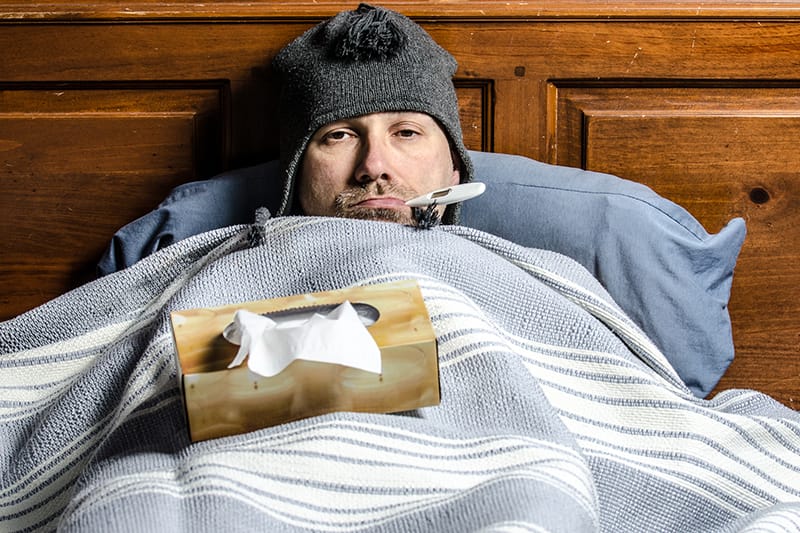You can get a flu shot just about anywhere: clinics, pharmacies, grocery stores — even some companies offer flu shots to employees. The vaccines are so convenient, and often incentivized, that there's really no excuse for not getting one.
Yet less than half the country gets their annual flu shot, according to data from the Centers for Disease Control and Prevention (CDC). And we're much better about vaccinating our children than we are ourselves.
So what gives?
There are many reasons flu vaccination coverage is low. Some think the vaccine will give them the flu. Others aren't convinced it can protect them at all. And some people are just afraid of needles. None of those are valid arguments, says Dr. Benjamin Monson, MD, internist at The Iowa Clinic in West Des Moines.
"The reason it's important to get the flu shot is because influenza is a very common and dangerous respiratory illness. It causes significant respiratory disease, hospitalizations and many deaths every year," he says. "But it's preventable. Sometimes we can prevent it altogether. Sometimes we prevent how severe the disease is."
The flu vaccine works — even if you get sick.
There are dozens of different strains of the flu. Over time, they morph — even in the middle of flu season. Each year, the CDC selects the strains it expects to spread during the upcoming flu season and outlines recommendations for the vaccines.
"The flu shot is interesting. We have to predict each year which strains of influenza are going to cause problems, and we make that prediction based on previous years — like a meteorologist predicting the weather," says Dr. Monson. "And like the weather, sometimes predictions are wrong. Last year was a low match and a lot of people got influenza."
Ideally, the flu shot would protect against 100 percent of influenza strains. But different strains are more powerful, and the vaccine is less effective against them. The CDC bases its selections on research and chooses the influenza A and influenza B viruses it believes are most likely to spread. Some years — 2017 included — there's an outbreak of an influenza A strain known as H3N2 that vaccines have a tougher time protecting against. But that's only one strain, and even in those low match years, the flu shot offers protection.
Timing is critical, Dr. Monson says. Flu season peaks in the winter months, December through February. If you get the flu shot too early, it's effectiveness might wane before influenza is at its worst, increasing the chances you'll get sick. For the most protection, schedule your flu vaccine no earlier than October 1. While it's better to get a flu shot late in the season than not at all, aim to get vaccinated before December so you're covered for as much of winter as possible.
"Get the flu shot. That's priority number one," advises Dr. Monson. "Priority two is to get it at a time when it's going to do your body the most good."
Flu shots are safe and don't make you sick.
The influenza vaccine might not be able to stop every case of the flu. But it is a safe way to help prevent it. While the vaccine injects antigens from the virus into your body, it's doing so to protect you, not infect you.
"Sometimes people get sick after getting the flu shot, but they do not actually get influenza. It's a common misconception," says Dr. Monson. "Some soreness, some achiness and even a mild fever can happen after a shot. That's purely your immune system responding as it should, and that does not mean you got the flu."
And if you did, it was either already incubating in your system or was an unexpected strain of the virus. The annual flu shot still protects you by helping your immune system ramp up to mount a response to the virus, reducing the duration and severity of the illness.
The flu shot is safe and recommended for nearly everyone. Only infants younger than six months old and people with life-threatening allergies to the influenza vaccine or its ingredients can't get the flu shot.
"Everybody should get it, but especially those who are over the age of 55 and or have any chronic medical conditions," says Dr. Monson. "The older you are or the more chronic conditions you have — like heart disease, lung disease or diabetes — the weaker your immune system, and that's even reason more to get it."
Some flu shots aren't shots at all.
Trypanophobia is no excuse for passing on flu shots either. You can avoid the needles altogether and get the flu vaccine sprayed up your nose.
"There are different formulations. There's a live nasal vaccine, as well as the injectable," says Dr. Monson. "They are equal. One is not preferred over the other."
As part of their annual flu coverage recommendations, the CDC makes the call on which vaccines should go into production. Some years, the intranasal live vaccine is not recommended and therefore, unavailable. But that's because of the flu virus strains it protects against, not it's overall effectiveness or safety.
There are some important differences with the nasal spray, though. It's made from a weakened live flu virus. It still cannot give you the flu, but it does come with different side effects. So the CDC takes precautions and only recommends the nasal vaccine be given to healthy people between the ages of two and 49. If you're older, pregnant or have a medical condition, the nasal vaccine is not preferred. The better option is to get the higher dosage of the injectable vaccine to better protect yourself against the flu.
Influenza is nothing to mess with. It causes high fevers, muscle aches, runny noses, coughing, sneezing, fatigue — even death. The flu shot is your best bet for preventing the worst case scenario or preventing the flu altogether. Schedule your flu shot with your primary care provider to protect yourself throughout all of flu season.


